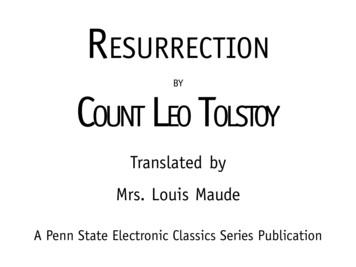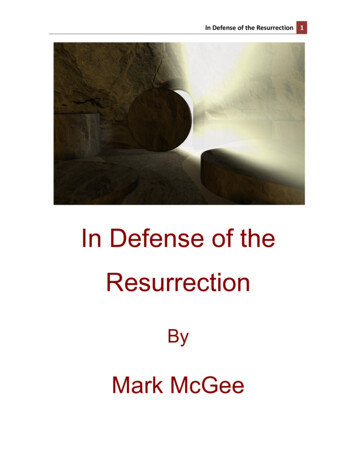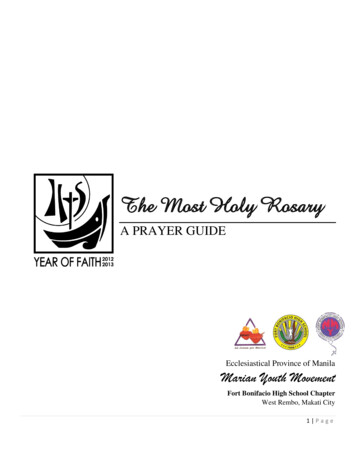
Transcription
RESURRECTIONBYCOUNT LEO TOLSTOYTranslated byMrs. Louis MaudeA Penn State Electronic Classics Series Publication
Resurrection by Leo Tolstoy, trans. Louis Maude is a publication of the Pennsylvania StateUniversity. This Portable Document file is furnished free and without any charge of anykind. Any person using this document file, for any purpose, and in any way does so at his orher own risk. Neither the Pennsylvania State University nor Jim Manis, Faculty Editor, noranyone associated with the Pennsylvania State University assumes any responsibility for thematerial contained within the document or for the file as an electronic transmission, in anyway.Resurrection by Leo Tolstoy, trans. Louis Maude, the Pennsylvania State University, ElectronicClassics Series, Jim Manis, Faculty Editor, Hazleton, PA 18201-1291 is a Portable DocumentFile produced as part of an ongoing student publication project to bring classical works ofliterature, in English, to free and easy access of those wishing to make use of them.Cover Design: Jim ManisCopyright 2000 The Pennsylvania State UniversityThe Pennsylvania State University is an equal opportunity university.
Tolstoyhave ever heard suggested is, that in England and Americasuch outlandish views are attributed to him, that an outlandish spelling is desirable to match those views.This novel, written in the rough by Tolstoy some yearsago and founded upon an actual occurrence, was completelyrewritten by him during the last year and a half, and all theproceeds have been devoted by him to aiding theDoukhobors, a sect who were persecuted in the Caucasus(especially from 1895 to 1898) for refusing to learn war.About seven thousand three hundred of them are settled inCanada, and about a hundred of the leaders are exiled tothe remote parts of Siberia.Anything I may receive for my work in translating thebook will go to the same cause. “Prevention is betterthan cure,” and I would rather help people to abstainfrom killing and wounding each other than devote themoney to patch up their wounds after the battle.RESURRECTIONBYCOUNT LEO TOLSTOYTranslated byMrs. Louis MaudeTRANSLATOR’S PREFACEOpinions about Tolstoy and his work differ, but on onepoint there surely might be unanimity. A writer of worldwide reputation should be at least allowed to know howto spell his own name. Why should any one insist on spelling it “Tolstoi” (with one, two or three dots over the “i”),when he himself writes it “Tolstoy”? The only reason ILouise Maude3
ResurrectionRESURRECTIONspring, were getting their nests ready; the flies were buzzingalong the walls, warmed by the sunshine. All were glad,the plants, the birds, the insects, and the children. Butmen, grown-up men and women, did not leave off cheating and tormenting themselves and each other. It was notthis spring morning men thought sacred and worthy ofconsideration not the beauty of God’s world, given for ajoy to all creatures, this beauty which inclines the heartto peace, to harmony, and to love, but only their owndevices for enslaving one another.Thus, in the prison office of the Government town, itwas not the fact that men and animals had received thegrace and gladness of spring that was considered sacredand important, but that a notice, numbered and with asuperscription, had come the day before, ordering that onthis 28th day of April, at 9 a.m., three prisoners at presentdetained in the prison, a man and two women (one ofthese women, as the chief criminal, to be conducted separately), had to appear at Court. So now, on the 28th ofApril, at 8 o’clock, a jailer and soon after him a womanwarder with curly grey hair, dressed in a jacket with sleevesCHAPTER IMASLOVA IN PRISONThough hundreds of thousands had done their very bestto disfigure the small piece of land on which they werecrowded together, by paying the ground with stones, scraping away every vestige of vegetation, cutting down thetrees, turning away birds and beasts, and filling the airwith the smoke of naphtha and coal, still spring was spring,even in the town.The sun shone warm, the air was balmy; everywhere,where it did not get scraped away, the grass revived andsprang up between the paving-stones as well as on thenarrow strips of lawn on the boulevards. The birches, thepoplars, and the wild cherry unfolded their gummy andfragrant leaves, the limes were expanding their openingbuds; crows, sparrows, and pigeons, filled with the joy of4
Tolstoytrimmed with gold, with a blue-edged belt round her waist,and having a look of suffering on her face, came into thecorridor.“You want Maslova?” she asked, coming up to the cellwith the jailer who was on duty.The jailer, rattling the iron padlock, opened the door ofthe cell, from which there came a whiff of air fouler eventhan that in the corridor, and called out, “Maslova! to theCourt,” and closed the door again.Even into the prison yard the breeze had brought thefresh vivifying air from the fields. But in the corridor theair was laden with the germs of typhoid, the smell ofsewage, putrefaction, and tar; every newcomer felt sadand dejected in it. The woman warder felt this, thoughshe was used to bad air. She had just come in from outside, and entering the corridor, she at once became sleepy.From inside the cell came the sound of bustle andwomen’s voices, and the patter of bare feet on the floor.“Now, then, hurry up, Maslova, I say!” called out thejailer, and in a minute or two a small young woman witha very full bust came briskly out of the door and went upto the jailer. She had on a grey cloak over a white jacketand petticoat. On her feet she wore linen stockings andprison shoes, and round her head was tied a white kerchief, from under which a few locks of black hair werebrushed over the forehead with evident intent. The face ofthe woman was of that whiteness peculiar to people whohave lived long in confinement, and which puts one inmind of shoots of potatoes that spring up in a cellar. Hersmall broad hands and full neck, which showed from under the broad collar of her cloak, were of the same hue.Her black, sparkling eyes, one with a slight squint, appeared in striking contrast to the dull pallor of her face.She carried herself very straight, expanding her full bosom.With her head slightly thrown back, she stood in thecorridor, looking straight into the eyes of the jailer, readyto comply with any order.The jailer was about to lock the door when a wrinkledand severe-looking old woman put out her grey head andbegan speaking to Maslova. But the jailer closed the door,pushing the old woman’s head with it. A woman’s laugh5
Resurrectionter was heard from the cell, and Maslova smiled, turningto the little grated opening in the cell door. The old womanpressed her face to the grating from the other side, andsaid, in a hoarse voice:“Now mind, and when they begin questioning you, justrepeat over the same thing, and stick to it; tell nothingthat is not wanted.”“Well, it could not be worse than it is now, anyhow; Ionly wish it was settled one way or another.”The soldier, a peasant from Nijni Novgorod, with a red,pock-marked face, put the paper into the sleeve of hiscoat, winked to his companion, a broad-shoulderedTchouvash, and then the prisoner and the soldiers went tothe front entrance, out of the prison yard, and throughthe town up the middle of the roughly-paved street.Isvostchiks [cabmen], tradespeople, cooks, workmen,and government clerks, stopped and looked curiously atthe prisoner; some shook their heads and thought, “This“Of course, it will be settled one way or another,” saidthe jailer, with a superior’s self-assured witticism. “Now,then, get along! Take your places!”The old woman’s eyes vanished from the grating, andMaslova stepped out into the middle of the corridor. Thewarder in front, they descended the stone stairs, past thestill fouler, noisy cells of the men’s ward, where they werefollowed by eyes looking out of every one of the gratingsin the doors, and entered the office, where two soldierswere waiting to escort her. A clerk who was sitting theregave one of the soldiers a paper reeking of tobacco, andpointing to the prisoner, remarked, “Take her.”is what evil conduct, conduct unlike ours, leads to.” Thechildren stopped and gazed at the robber with frightenedlooks; but the thought that the soldiers were preventingher from doing more harm quieted their fears. A peasant,who had sold his charcoal, and had had some tea in thetown, came up, and, after crossing himself, gave her acopeck. The prisoner blushed and muttered something;she noticed that she was attracting everybody’s attention, and that pleased her. The comparatively fresh airalso gladdened her, but it was painful to step on therough stones with the ill-made prison shoes on her feet,which had become unused to walking. Passing by a corn6
Tolstoybeen baptised and then not sufficiently fed, and just leftto die. The sixth baby, whose father was a gipsy tramp,would have shared the same fate, had it not so happenedthat one of the maiden ladies came into the farmyard toscold the dairymaids for sending up cream that smelt ofthe cow. The young woman was lying in the cowshed witha fine, healthy, new-born baby. The old maiden lady scoldedthe maids again for allowing the woman (who had justbeen confined) to lie in the cowshed, and was about togo away, but seeing the baby her heart was touched, andshe offered to stand godmother to the little girl, and pityfor her little god-daughter induced her to give milk and alittle money to the mother, so that she should feed thebaby; and the little girl lived. The old ladies spoke of heras “the saved one.” When the child was three years old,her mother fell ill and died, and the maiden ladies tookthe child from her old grandmother, to whom she wasnothing but a burden.The little black-eyed maiden grew to be extremely pretty,and so full of spirits that the ladies found her very entertaining.dealer’s shop, in front of which a few pigeons were strutting about, unmolested by any one, the prisoner almosttouched a grey-blue bird with her foot; it fluttered upand flew close to her car, fanning her with its wings. Shesmiled, then sighed deeply as she remembered her presentposition.CHAPTER IIMASLOVA’S EARLY LIFEThe story of the prisoner Maslova’s life was a very common one.Maslova’s mother was the unmarried daughter of a village woman, employed on a dairy farm, which belongedto two maiden ladies who were landowners. This unmarried woman had a baby every year, and, as often happensamong the village people, each one of these undesiredbabies, after it had been carefully baptised, was neglectedby its mother, whom it hindered at her work, and left tostarve. Five children had died in this way. They had all7
ResurrectionThe younger of the ladies, Sophia Ivanovna, who hadstood godmother to the girl, had the kinder heart of thetwo sisters; Maria Ivanovna, the elder, was rather hard.Sophia Ivanovna dressed the little girl in nice clothes, andtaught her to read and write, meaning to educate her likea lady. Maria Ivanovna thought the child should be broughtup to work, and trained her to be a good servant. She wasexacting; she punished, and, when in a bad temper, evenstruck the little girl. Growing up under these two differ-versity student, came to stay with his aunts, and Katusha,not daring to acknowledge it even to herself, fell in lovewith him.Then two years later this same nephew stayed four dayswith his aunts before proceeding to join his regiment, andthe night before he left he betrayed Katusha, and, aftergiving her a 100-rouble note, went away. Five monthslater she knew for certain that she was to be a mother.After that everything seemed repugnant to her, her onlyent influences, the girl turned out half servant, half younglady. They called her Katusha, which sounds less refinedthan Katinka, but is not quite so common as Katka. Sheused to sew, tidy up the rooms, polish the metal cases ofthe icons and do other light work, and sometimes she satand read to the ladies.Though she had more than one offer, she would notmarry. She felt that life as the wife of any of the workingmen who were courting her would be too hard; spoilt asshe was by a life of case.She lived in this manner till she was sixteen, when thenephew of the old ladies, a rich young prince, and a uni-thought being how to escape from the shame that awaitedher. She began not only to serve the ladies in a halfhearted and negligent way, but once, without knowinghow it happened, was very rude to them, and gave themnotice, a thing she repented of later, and the ladies let hergo, noticing something wrong and very dissatisfied withher. Then she got a housemaid’s place in a police-officer’shouse, but stayed there only three months, for the policeofficer, a man of fifty, began to torment her, and once,when he was in a specially enterprising mood, she firedup, called him “a fool and old devil,” and gave him sucha knock in the chest that he fell. She was turned out for8
Tolstoyher rudeness. It was useless to look for another situation,for the time of her confinement was drawing near, so shewent to the house of a village midwife, who also soldwine. The confinement was easy; but the midwife, whohad a case of fever in the village, infected Katusha, andher baby boy had to be sent to the foundlings’ hospital,where, according to the words of the old woman whotook him there, he at once died. When Katusha went tothe midwife she had 127 roubles in all, 27 which she hadearned and 100 given her by her betrayer. When she leftshe had but six roubles; she did not know how to keepmoney, but spent it on herself, and gave to all who asked.The midwife took 40 roubles for two months’ board andattendance, 25 went to get the baby into the foundlings’hospital, and 40 the midwife borrowed to buy a cow with.Twenty roubles went just for clothes and dainties. Havingnothing left to live on, Katusha had to look out for aplace again, and found one in the house of a forester. Theforester was a married man, but he, too, began to annoyher from the first day. He disgusted her, and she tried toavoid him. But he, more experienced and cunning, be-sides being her master, who could send her wherever heliked, managed to accomplish his object. His wife foundit out, and, catching Katusha and her husband in a roomall by themselves, began beating her. Katusha defendedherself, and they had a fight, and Katusha got turned outof the house without being paid her wages.Then Katusha went to live with her aunt in town. Theaunt’s husband, a bookbinder, had once been comfortablyoff, but had lost all his customers, and had taken todrink, and spent all he could lay hands on at the publichouse. The aunt kept a little laundry, and managed tosupport herself, her children, and her wretched husband.She offered Katusha the place of an assistant laundress;but seeing what a life of misery and hardship her aunt’sassistants led, Katusha hesitated, and applied to a registry office for a place. One was found for her with a ladywho lived with her two sons, pupils at a public day school.A week after Katusha had entered the house the elder, abig fellow with moustaches, threw up his studies and madelove to her, continually following her about. His motherlaid all the blame on Katusha, and gave her notice.9
ResurrectionIt so happened that, after many fruitless attempts tofind a situation, Katusha again went to the registry office,and there met a woman with bracelets on her bare, plumparms and rings on most of her fingers. Hearing that Katushawas badly in want of a place, the woman gave her heraddress, and invited her to come to her house. Katushawent. The woman received her very kindly, set cake andsweet wine before her, then wrote a note and gave it to aservant to take to somebody. In the evening a tall man,for her, and she went. He gave her another 25 roubles,and offered her a separate lodging.Next door to the lodging rented for her by the authorthere lived a jolly young shopman, with whom Katushasoon fell in love. She told the author, and moved to a littlelodging of her own. The shopman, who promised to marryher, went to Nijni on business without mentioning it to her,having evidently thrown her up, and Katusha remained alone.She meant to continue living in the lodging by herself, butwith long, grey hair and a white beard, entered the room,and sat down at once near Katusha, smiling and gazing ather with glistening eyes. He began joking with her. Thehostess called him away into the next room, and Katushaheard her say, “A fresh one from the country,” Then thehostess called Katusha aside and told her that the manwas an author, and that he had a great deal of money, andthat if he liked her he would not grudge her anything. Hedid like her, and gave her 25 roubles, promising to see heroften. The 25 roubles soon went; some she paid to heraunt for board and lodging; the rest was spent on a hat,ribbons, and such like. A few days later the author sentwas informed by the police that in this case she would haveto get a license. She returned to her aunt. Seeing her finedress, her hat, and mantle, her aunt no longer offered herlaundry work. As she understood things, her niece had risenabove that sort of thing. The question as to whether shewas to become a laundress or not did not occur to Katusha,either. She looked with pity at the thin, hard-worked laundresses, some already in consumption, who stood washingor ironing with their thin arms in the fearfully hot frontroom, which was always full of soapy steam and draughtsfrom the windows, and thought with horror that she mighthave shared the same fate.10
TolstoyKatusha had begun to smoke some time before, andsince the young shopman had thrown her up she was getting more and more into the habit of drinking. It was notso much the flavour of wine that tempted her as the factthat it gave her a chance of forgetting the misery shesuffered, making her feel more unrestrained and more confident of her own worth, which she was not when quitesober; without wine she felt sad and ashamed. Just atthis time a woman came along who offered to place her inone of the largest establishments in the city, explainingall the advantages and benefits of the situation. Katushahad the choice before her of either going into service oraccepting this offer—and she chose the latter. Besides, itseemed to her as though, in this way, she could revengeherself on her betrayer and the shopman and all thosewho had injured her. One of the things that tempted her,and was the cause of her decision, was the woman tellingher she might order her own dresses—velvet, silk, satin,low-necked ball dresses, anything she liked. A mental picture of herself in a bright yellow silk trimmed with blackvelvet with low neck and short sleeves conquered her, andshe gave up her passport. On the same evening theprocuress took an isvostchik and drove her to the notorious house kept by Carolina Albertovna Kitaeva.From that day a life of chronic sin against human anddivine laws commenced for Katusha Maslova, a life whichis led by hundreds of thousands of women, and which isnot merely tolerated but sanctioned by the Government,anxious for the welfare of its subjects; a life which fornine women out of ten ends in painful disease, prematuredecrepitude, and death.Katusha Maslova lived this life for seven years. Duringthese years she twice changed houses, and had once beento the hospital. In the seventh year of this life, when shewas twenty-six years old, happened that for which shewas put in prison and for which she was now being takento be tried, after more than three months of confinementwith thieves and murderers in the stifling air of a prison.11
ResurrectionCHAPTER IIItooth powder, and rinsed his mouth with scented elixir.After that he washed his hands with perfumed soap, cleanedhis long nails with particular care, then, from a tap fixedto his marble washstand, he let a spray of cold water runover his face and stout neck. Having finished this part ofthe business, he went into a third room, where a showerbath stood ready for him. Having refreshed his full, white,muscular body, and dried it with a rough bath sheet, heput on his fine undergarments and his boots, and satdown before the glass to brush his black beard and hiscurly hair, that had begun to get thin above the forehead.Everything he used, everything belonging to his toilet,his linen, his clothes, boots, necktie, pin, studs, was ofthe best quality, very quiet, simple, durable and costly.Nekhludoff dressed leisurely, and went into the diningroom. A table, which looked very imposing with its fourlegs carved in the shape of lions’ paws, and a huge sideboard to match, stood in the oblong room, the floor ofwhich had been polished by three men the day before. Onthe table, which was covered with a fine, starched cloth,stood a silver coffeepot full of aromatic coffee, a sugarNEKHLUDOFFWhen Maslova, wearied out by the long walk, reached thebuilding, accompanied by two soldiers, Prince DmitriIvanovitch Nekhludoff, who had seduced her, was still lying on his high bedstead, with a feather bed on the top ofthe spring mattress, in a fine, clean, well-ironed linennight shirt, smoking a cigarette, and considering what hehad to do to-day, and what had happened yesterday.Recalling the evening he had spent with the Korchagins,a wealthy and aristocratic family, whose daughter everyone expected he would marry, he sighed, and, throwingaway the end of his cigarette, was going to take anotherout of the silver case; but, changing his mind, he resolutely raised his solid frame, and, putting down his smooth,white legs, stepped into his slippers, threw his silk dressing gown over his broad shoulders, and passed into hisdressing-room, walking heavily and quickly. There he carefully cleaned his teeth, many of which were filled, with12
Tolstoybasin, a jug of fresh cream, and a bread basket filled withfresh rolls, rusks, and biscuits; and beside the plate laythe last number of the Revue des Deux Mondes, a newspaper, and several letters.Nekhludoff was just going to open his letters, when astout, middle-aged woman in mourning, a lace cap covering the widening parting of her hair, glided into the room.This was Agraphena Petrovna, formerly lady’s maid toNekhludoff’s mother. Her mistress had died quite recentlyin this very house, and she remained with the son as hishousekeeper. Agraphena Petrovna had spent nearly tenyears, at different times, abroad with Nekhludoff’s mother,and had the appearance and manners of a lady. She hadlived with the Nekhludoffs from the time she was a child,and had known Dmitri Ivanovitch at the time when hewas still little Mitinka.“Good-morning, Dmitri Ivanovitch.”“Good-morning, Agraphena Petrovna. What is it youwant?” Nekhludoff asked.“A letter from the princess; either from the mother orthe daughter. The maid brought it some time ago, and iswaiting in my room,” answered Agraphena Petrovna, handing him the letter with a significant smile.“All right! Directly!” said Nekhludoff, taking the letterand frowning as he noticed Agraphena Petrovna’s smile.That smile meant that the letter was from the youngerPrincess Korchagin, whom Agraphena Petrovna expectedhim to marry. This supposition of hers annoyed Nekhludoff.“Then I’ll tell her to wait?” and Agraphena Petrovnatook a crumb brush which was not in its place, put itaway, and sailed out of the room.Nekhludoff opened the perfumed note, and began reading it.The note was written on a sheet of thick grey paper,with rough edges; the writing looked English. It said:Having assumed the task of acting as your memory, Itake the liberty of reminding you that on this the 28thday of April you have to appear at the Law Courts, asjuryman, and, in consequence, can on no account accompany us and Kolosoff to the picture gallery, as, with yourhabitual flightiness, you promised yesterday; a moins quevous ne soyez dispose a payer la cour d’assise les 30013
Resurrectionroubles d’amende que vous vous refusez pour votre cheval,for not appearing in time. I remembered it last night afteryou were gone, so do not forget.mind to it, he could not propose at once. It was not thatten years previously he had betrayed and forsaken Maslova;he had quite forgotten that, and he would not have considered it a reason for not marrying. No! The reason wasthat he had a liaison with a married woman, and, thoughhe considered it broken off, she did not.Nekhludoff was rather shy with women, and his veryshyness awakened in this married woman, the unprincipledwife of the marechal de noblesse of a district wherePrincess M. Korchagin.On the other side was a postscript.Maman vous fait dire que votre convert vous attendrajusqu’a la nuit. Venez absolument a quelle heure que celasoit.Nekhludoff was present at an election, the desire of vanquishing him. This woman drew him into an intimacy whichentangled him more and more, while it daily became moredistasteful to him. Having succumbed to the temptation,Nekhludoff felt guilty, and had not the courage to breakthe tie without her consent. And this was the reason hedid not feel at liberty to propose to Korchagin even if hehad wished to do so. Among the letters on the table wasone from this woman’s husband. Seeing his writing andthe postmark, Nekhludoff flushed, and felt his energiesawakening, as they always did when he was facing anykind of danger.M. K.Nekhludoff made a grimace. This note was a continuation of that skilful manoeuvring which the PrincessKorchagin had already practised for two months in orderto bind him closer and closer with invisible threads. Andyet, beside the usual hesitation of men past their youthto marry unless they are very much in love, Nekhludoffhad very good reasons why, even if he did make up his14
TolstoyBut his excitement passed at once. The marechal donoblesse, of the district in which his largest estate lay,wrote only to let Nekhludoff know that there was to be aspecial meeting towards the end of May, and thatNekhludoff was to be sure and come to “donner un coupd’epaule,” at the important debates concerning the schoolsand the roads, as a strong opposition by the reactionaryparty was expected.The marechal was a liberal, and was quite engrossed inthis fight, not even noticing the misfortune that had befallen him.Nekhludoff remembered the dreadful moments he hadlived through; once when he thought that the husbandhad found him out and was going to challenge him, andhe was making up his mind to fire into the air; also theterrible scene he had with her when she ran out into thepark, and in her excitement tried to drown herself in thepond.“Well, I cannot go now, and can do nothing until I geta reply from her,” thought Nekhludoff. A week ago he hadwritten her a decisive letter, in which he acknowledgedhis guilt, and his readiness to atone for it; but at thesame time he pronounced their relations to be at an end,for her own good, as he expressed it. To this letter he hadas yet received no answer. This might prove a good sign,for if she did not agree to break off their relations, shewould have written at once, or even come herself, as shehad done before. Nekhludoff had heard that there wassome officer who was paying her marked attention, andthis tormented him by awakening jealousy, and at thesame time encouraged him with the hope of escape fromthe deception that was oppressing him.The other letter was from his steward. The steward wroteto tell him that a visit to his estates was necessary inorder to enter into possession, and also to decide aboutthe further management of his lands; whether it was tocontinue in the same way as when his mother was alive, orwhether, as he had represented to the late lamented princess, and now advised the young prince, they had notbetter increase their stock and farm all the land now rentedby the peasants themselves. The steward wrote that thiswould be a far more profitable way of managing the prop15
Resurrectionerty; at the same time, he apologised for not having forwarded the 3,000 roubles income due on the 1st. Thismoney would he sent on by the next mail. The reason forthe delay was that he could not get the money out of thepeasants, who had grown so untrustworthy that he had toappeal to the authorities. This letter was partly disagreeable, and partly pleasant. It was pleasant to feel that hehad power over so large a property, and yet disagreeable,because Nekhludoff had been an enthusiastic admirer ofgive up his property, as he had given up his father’s landten years before, or silently to confess that all his formerideas were mistaken and false.He could not choose the former because he had no meansbut the landed estates (he did not care to serve); moreover, he had formed luxurious habits which he could noteasily give up. Besides, he had no longer the same inducements; his strong convictions, the resoluteness of youth,and the ambitious desire to do something unusual wereHenry George and Herbert Spencer. Being himself heir to alarge property, he was especially struck by the positiontaken up by Spencer in Social Statics, that justice forbidsprivate landholding, and with the straightforward resoluteness of his age, had not merely spoken to prove thatland could not be looked upon as private property, andwritten essays on that subject at the university, but hadacted up to his convictions, and, considering it wrong tohold landed property, had given the small piece of land hehad inherited from his father to the peasants. Inheritinghis mother’s large estates, and thus becoming a landedproprietor, he had to choose one of two things: either togone. As to the second course, that of denying thoseclear and unanswerable proofs of the injustice of landholding, which he had drawn from Spencer’s Social Statics, and the brilliant corroboration of which he had at alater period found in the works of Henry George, such acourse was impossible to him.16
TolstoyCHAPTE
Resurrection by Leo Tolstoy, trans. Louis Maude, the Pennsylvania State University, Electronic Classics Series, Jim Manis, Faculty Editor, Hazleton, PA 18201-1291 is a Portable Document File produced as part of an ongoing student publication project to bring classical works of literature, in










